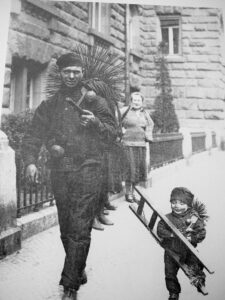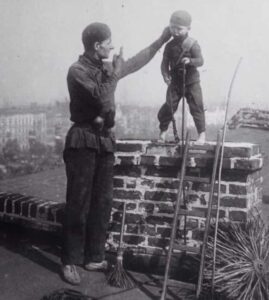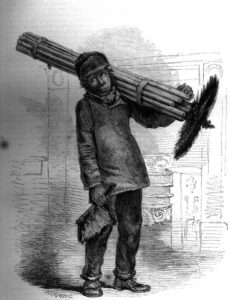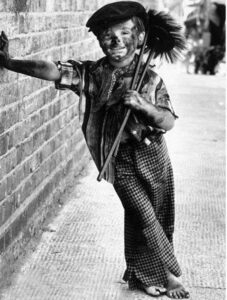
 Perhaps one of the most questionable of all professions undertaken by children in the past was that of chimney sweeping. Not only were children exploited in this job, mostly because of their small stature, but since proper safety measures were not taken in those days, the children in those jobs had health problems for the rest of their lives, and very likely they died young. The use of children as chimney sweeps began in the late 1600s in England, after the Great Fire of London, which gutted the city. At that time, building codes changed, requiring chimneys to be much narrower than they were previously. The idea was to keep more of the sparks in than out.
Perhaps one of the most questionable of all professions undertaken by children in the past was that of chimney sweeping. Not only were children exploited in this job, mostly because of their small stature, but since proper safety measures were not taken in those days, the children in those jobs had health problems for the rest of their lives, and very likely they died young. The use of children as chimney sweeps began in the late 1600s in England, after the Great Fire of London, which gutted the city. At that time, building codes changed, requiring chimneys to be much narrower than they were previously. The idea was to keep more of the sparks in than out.
The new design brought with it a bigger problem…keeping the chimneys free of obstruction, which became more of a challenge and a priority. Amazingly, instead of someone inventing a tool for this purpose, children were employed as human chimney sweeps. Their small stature allowed them to go inside the chimneys and manually sweep away the soot. Thus practice went on for over 200 years, in spite of the deplorable conditions the children lived in, the horrible health effects they suffered, and the many injuries and fatalities resulting from related work hazards.
One former chimney sweep, James Seaward was interviewed in December 1909, by the Toronto Saturday Night, a Canadian publication. Seaward was living in Wokingham, where he had just been named alderman of the town’s Borough Council. Seaward was one of the fortunate few that were still alive after working as a chimney sweep for 58 years. He started when he was just six. Seaward tells how he “was only six years old when I went up my first chimney. I was an orphan and I fell into the hands of a chimney sweep, and a cruel master he was. I have known what it was to have straw lighted under me and pins stuck into the soles of my feet to force me up a chimney; and I have known, too, what it was to come down covered with blood and soot after climbing with my knees and elbows. No one knows the terrible cruelty inflicted on boys in those days. 
 They used to be steeped in strong brine to harden their flesh. In my own case soda was used. Sometimes I used to have to stay up a difficult chimney five or six hours at a stretch.”
They used to be steeped in strong brine to harden their flesh. In my own case soda was used. Sometimes I used to have to stay up a difficult chimney five or six hours at a stretch.”
Somehow, Seaward managed to survive, and to actually prosper, even is such deplorable conditions. Thankfully, such cruelty was outlawed during the nineteenth century, with laws introduced regarding child labor. Those laws didn’t address chimney sweeps specifically, but rather child labor in general. The things that were allowed in the past concerning child labor were just awful, and orphans were specifically targeted, because they had little protections over their lives. They were often “adopted” out, but their “new parents” sometimes just wanted slave labor.


Leave a Reply